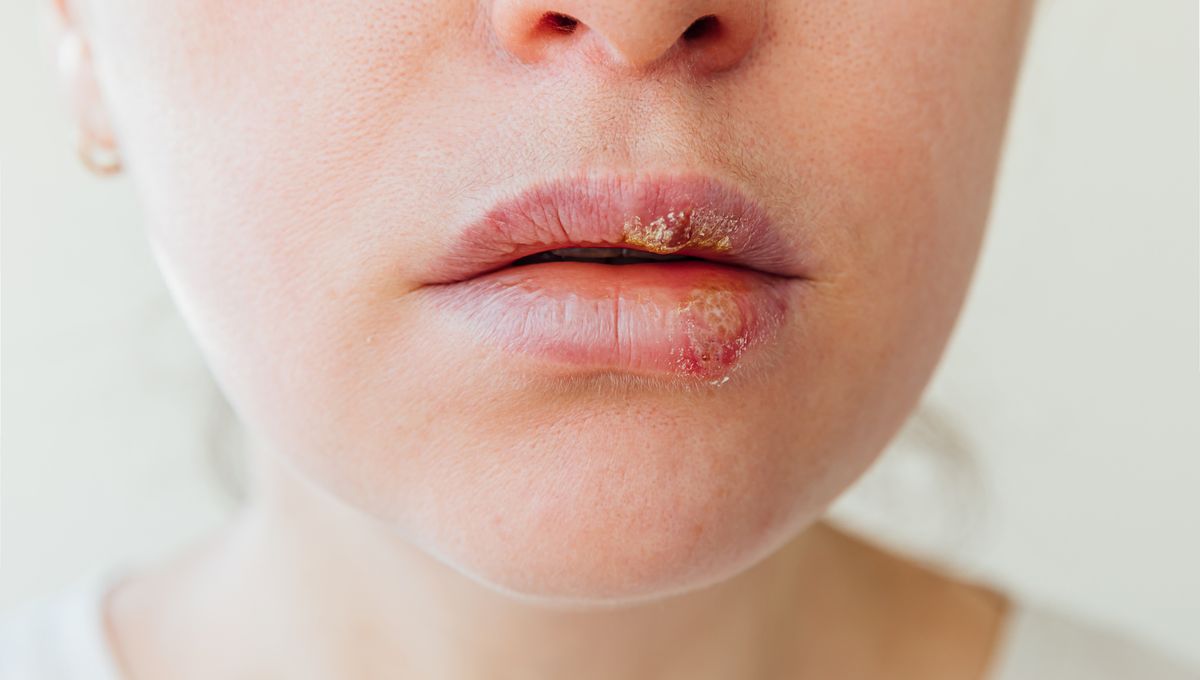
We’re sorry to inform you that you probably have herpes. The good news, should you choose to view it that way, is that you’re in good company. Well over 3 billion people around the world are thought to be carriers of herpes simplex virus type 1 (HSV-1), which means that a decent proportion of them will be all too familiar with the dreaded tingling sensation that heralds the onset of a cold sore. We know that this pesky virus is the cause – but can you also blame your genes?
What are cold sores?
Cold sores are blisters that form on the face, often around the lip area. Over the course of about 10 days, the blister will form, burst, and scab over. While not usually dangerous, cold sores can be painful and irritating. They’re also highly contagious, which is why it’s vital to avoid kissing and performing oral sex until the sore has healed, and to wash your hands after touching the area.
This is particularly important in the case of newborn babies and young children. If someone with an active cold sore kisses a baby, there’s a chance they can pass on the herpes virus to the little one, causing what can be a life-threatening infection thanks to their underdeveloped immune systems.
But despite people’s best efforts, HSV-1 is a tricky customer. It’s become so common within the adult population because a lot of people simply don’t realize they have it and spread it around without knowing.
What causes cold sores?
Once you have HSV-1 inside your cells, there’s no getting rid of it. Much of the time, it lies dormant in clusters of nerve cells, but various factors can trigger its activation.
These factors will be different for different people, but common ones include:
- Another illness, injury, or undergoing surgery
- Medical treatment that weakens the immune system, such as cancer chemotherapy
- Exposure to the Sun
- Stress
- Menstruation
Not everyone who is a carrier of HSV-1 will experience cold sores. Until quite recently, scientists were unsure why this is the case, but now research appears to show that it could all be down to your genes.
Are cold sores genetic?
Cold sores are not genetic in the way we might think of a genetic disease – conditions that are passed from parents to their children via genetic mutations, such as cystic fibrosis or hemophilia. But that doesn’t mean that your genes don’t play a role.
Research suggests that the unlucky few who go on to develop recurrent cold sores after infection with HSV-1 have genetically predetermined factors that affect how well their immune system can respond to the virus.
In a letter published in The Journal Of Infectious Disease in 2008, two researchers outlined data they had gathered a decade prior that suggested the gene for a protein called apolipoprotein E-ɛ4 – more often associated with Alzheimer’s disease – is linked to cold sore risk.
In 2013, scientists screened thousands of genes and identified several that help the immune system mount a defense against HSV-1 activation. One of these genes, IL28b, was found to be mutated in patients who suffer from cold sores.
Another study in 2014 described a gene that’s been helpfully named Cold Sore Susceptibility Gene-1, which appears to do exactly what it says on the tin. Slight variations in the sequence of this gene can affect whether someone is more or less likely to get frequent cold sores once they’ve been infected with HSV-1.
Recent genetic research has also been able to delve into the history of HSV-1 in humans, with one study suggesting it probably all kicked off when we started kissing each other.
“[S]omething happened around five thousand years ago that allowed one strain of herpes to overtake all others, possibly an increase in transmissions, which could have been linked to kissing,” explained co-senior study author Dr Christiana Scheib in a statement at the time.
The first recorded kiss in humans can be traced back 4,500 years, but we can’t say for sure that our ancestors weren’t locking lips before that.
“In fact, research into bonobos and chimpanzees, the closest living relatives to humans, has shown that both species engage in kissing,” said Dr Sophie Lund Rasmussen, co-author of an article about the history of kissing, in a 2023 statement.
Rasmussen and first author Troels Pank Arbøll went on to explain in their paper that, as neat an explanation as it may be, it’s probably a step too far to simply blame an upsurge in ancient tonsil hockey for all of our cold sore misery today.
It’s an uncomfortable truth that nearly all of us will be exposed to HSV-1 at some point. For an unlucky subset of people, that means a lifetime of dealing with the periodic annoyance of a cold sore – and for most of them, as scientists are continuing to explore, it’s likely that their genes are to blame.
All “explainer” articles are confirmed by fact checkers to be correct at time of publishing. Text, images, and links may be edited, removed, or added to at a later date to keep information current.
Source Link: Are Cold Sores Genetic?